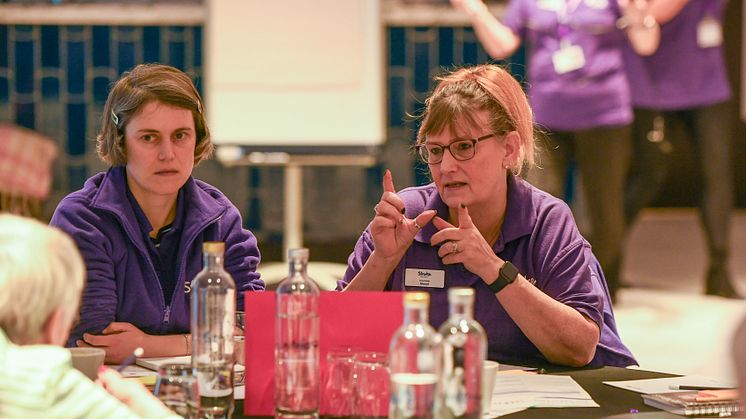
Press release -
Scale of stroke in Dumfries & Galloway prompts call for volunteers to help provide support
The latest statistics on the scale of stroke in Dumfries and Galloway show 325 people had a stroke in 20231, with admissions across both Dumfries & Galloway Royal Infirmary and Galloway Community Hospital.
The Stroke Association estimates that 60%2 of these people will be left with some form of disability, while the charity’s research has found that 75% are likely to experience mental health issues3.
So, for Volunteers’ Week, the Stroke Association is calling for new volunteers to come forward to help provide support to stroke survivors and their loved ones, as they navigate life after stroke.
The Stroke Association has received National Lottery Community Fund money to expand its support for people affected by stroke in Scotland. Anyone who volunteers would be assisted by a local engagement officer to provide face-to-face support as well as, potentially, telephone support.
The Stroke Association provides a raft of resources and support including on its website www.stroke.org.uk and by phone via its Stroke Support Helpline.
However, support provided by people who have had experience of stroke is a powerful way to help stoke survivors and their families to adjust to the life-changing condition. So, the Stroke Association is particularly keen to hear from people who have had a stroke, or have supported someone who has, and want to use their experience to help others.
There are currently two Stroke Association volunteers in Dumfries and Galloway – see below – but the ambition is to recruit more to work in partnership with the health board to support stroke survivors and their families in appropriate settings.
John Watson, Associate Director for the Stroke Association in Scotland, said:
“The number of people having strokes in Scotland is anticipated to rise in the coming years and we’ve found that more than 50% of Scottish adults have a close personal connection to stroke – whether having had one or seen a close friend or relative affected4.
“Our volunteers’ work is varied and rewarding, with the potential for learning and development opportunities and we would love to hear from anyone who would like to get involved.”
There is strong evidence that volunteering benefits volunteers as well as the people they support. Stroke Association volunteers say it helps them to feel they are giving something back, as well as being able to meet new people and develop their skills and confidence.
Anyone wishing to volunteer with the Stroke Association can contact the charity’s engagement team in Scotland at engagementteamscotland@stroke.org.uk.
To find out more about the Stroke Association’s work in Scotland, visit https://www.stroke.org.uk/scotland
The Stroke Association supports stroke survivors and their families online, by phone, and in the community. Find out more at www.stroke.org.uk
Volunteer case study
Sheryl Herring from Dumfries was an energetic mother of two, working full time in health and social care, when her husband, Bruce, had a massive stroke aged 49. Sheryl recalls Bruce was given a 5% chance of survival and their world turned upside down. Bruce was hospitalised for 11 months (between Dumfries & Galloway Royal Infirmary and the Western General in Edinburgh) and emerged wheelchair bound, suffering from severe bouts of depression.
Sheryl became her husband’s full-time carer, which changed the family’s entire dynamic and financial situation, and she started to feel the pressure. She had a breakdown and found the friends she used to rely on peeled away. She says it was a constant battle to get Bruce the help he needed, so she started to research what support was available and discovered the Stroke Association and Dumfries & Galloway Carers Centre.
Sheryl is now a volunteer for the Stroke Association and a highly valued part of the stroke community in Dumfries and Galloway. She visits the stroke ward at Dumfries & Galloway Royal Infirmary every Monday to tell patients and families about Stroke Association support and what is available in the local area. Every two weeks she visits Lochmaben Community Rehabilitation Unit to help patients further into their recovery. Sheryl has recently started a peer support group, which happens on the first Thursday of every month in the Cluden Unit at Mountainhall Treatment Centre in Dumfries.
She is passionate about improving stroke treatment and care in Dumfries and Galloway and recently met Finlay Carson MSP who was fascinated to hear about her work.
Sheryl comments: “It was a revelation to find people going through what I’d been through, and I get a lot of support from Stroke Association ‘Community Connectors’ whose job it is to signpost stroke survivors and their families to the services and support the charity provides.
“I feel my experience puts me in a very good position to provide a sympathetic ear and reassure people they are not alone.”
Stewart Anderson from Newton Stewart is the other Stroke Association volunteer in Dumfries and Galloway.
2. Sentinel Stroke National Audit Programme. https://www.strokeaudit.org/Results2/Clinical-audit/National-Results.aspx
3. Stroke Association Lived Experience of Stroke report 2019 lived_experience_of_stroke_chapter_1.pdf
4. All figures, unless otherwise stated, are from YouGov Plc. Total sample size was 1009 adults. Fieldwork was undertaken between 11th - 15th April 2024.
The survey was carried out online. The figures have been weighted and are representative of all Scotland adults (aged 18+).
Topics
Categories
Regions
Over 90,000 people survive a stroke every year in the UK, but surviving a stroke is just the start of a long and traumatic battle to finding their way back to life.
The Stroke Association is the only charity in the UK providing life-long support for all stroke survivors and their families. We provide tailored support to tens of thousands of stroke survivors each year, fund vital scientific research, and campaign to bring the best care and support for everyone affected by stroke.
Anyone affected by stroke can visit stroke.org.uk or call our dedicated Stroke Support Helpline on 0303 3033 100 for information, guidance or a chat when times are tough.











